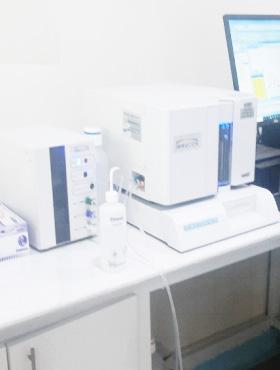
11 minute read
KNH Laboratories: A critical look at what is on offer
By Kilivwa Mukaya
Transplant Immunology Laboratory
Advertisement
This is the ‘new kid on the block’. The establishment of this laboratory has been received with jubilation from our clients who no longer depend on foreign laboratories for HLA tissue typing services.
The laboratory opened its door to patients on December 14, 2021. Among the tests that are readily available includes; HLA-A, B, C, DR, DQ, DP, Class I&II Antibody, Class I ID Antibody Detection, Class II IDv2 Antibody Detection, Donor Specific Antibody Detection, Single Antigen Class I Detection, Single Antigen Class II Detection, Single Antigen MIC Antibody Detection, and Complement Dependent Cytotoxicity.
We aim to play among the best as we continue to offer efficient and effective histocompatibility and Immunogenetics services. Of utmost importance is the intended plan to enroll the laboratory in the American Society of Histocompatibility and Immunogenetics (ASHI) accreditation program to maintain high standards of operation.
Clinical Chemistry Laboratory
It is also known as chemical pathology, clinical biochemistry or medical biochemistry Lab is generally concerned with the analysis of body fluids for diagnostic and therapeutic purposes.
Our clinical Chemistry laboratory is highly automated to accommodate the high workload typical of a level 6 hospital laboratory.
Tests performed are closely monitored and quality controlled. Like all our other laboratories, we participate in the External Quality Control program. We handle a large array of tests which can be categorized into sub-specialties of:
General chemistry tests are commonly ordered blood chemistries such as liver and kidney function tests. Immunochemistry tests encompass clinical endocrinology, such as; Fertility hormones, Thyroid function tests, and tumor markers (EG CA 125, CEA, AFP) Vitamins and anemia testing (vitamin D, Vitamin B12 Ferritin).
Clinical Toxicology assays involve studies of drugs-of-abuse screening such as; marijuana, cocaine, methaphetamines, tricyclic antidepressants(TCA), among others. Therapeutic involves measurement of therapeutic medication levels to optimize dosage (Tacrolimus, Sirolimus, Cyclosporine).
Urine and body fluids chemistry involves chemical analysis of urine, body fluids such as CSF, and effusions. Dynamic tests include body challenge tests such as glucose tolerance testing.
The laboratory can handle further, special immunology tests such as; TORCHES (Toxoplasmosis IgG/IgM, Rubella virus IgG/IgM, Cytomegalovirus IgG/IgM, Herpes simplex I$II virus IgG/IgM, Epstein barr virus IgG/IgM, Syphilis) Procalcitonin, Anti-nuclear antibodies, Anti-CCP. The laboratory is set to expand the test menu in line with demand and technological advancement.
Newly installed state-of-the-art clinical Chemistry machine that is proving to be a game-changer in a service delivery machine installed in a clinical chemistry laboratory.
PHOTO | COURTESY
LUMINEX fluoroanalyzer machine for HLA tissue typing Olympus microscope for Complement Dependent Cytotoxicity
PHOTO | COURTESY
Olympus microscope for Complement Dependent Cytotoxicity
Microbiology Laboratory
This is the laboratory where isolation and characterization of microorganisms causing infections are performed. This has two important functions. The first is clinical - everyday management of infections. The second is epidemiological - knowledge of an infective microbe in a patient which can lead to finding its source and route of transmission. This allows staff to stop infections from spreading.
Furthermore, the microbiology laboratory interprets microbiology data for clinicians and Infection Prevention and Control professionals, thus participating in Health Care Workers education. The microbiology laboratory also participates in the development of an institution’s antibiotic policy.
Most Hospital Acquired Infections (HAIs) are caused by bacteria and fungi that can be more antibioticresistant than community-acquired pathogens or their susceptibility to antibiotics is less predictable. Etiological diagnosis of HAIs is therefore exceptionally important for targeted antimicrobial chemotherapy.
Our microbiology laboratory has become more important in clinical medicine and the prevention of HAIs, especially as new or antibioticresistant pathogens emerge and new diagnostic technologies are developed.
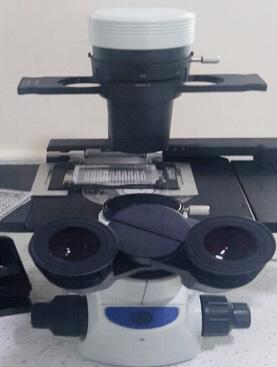
We can diagnose the most common infectious agents, especially those causing hospitalacquired infection (HAIs), and determine susceptibility to antibiotics for bacteria and fungi. This leads to targeted antimicrobial therapy with better patient outcomes. Subsequently, as eradication of a pathogen is achieved earlier, the danger of transmission to other patients is decreased.
Parasitology Laboratory
This is classified as a medical parasitology laboratory. Medical parasitology is the subject that deals with the parasites that infect humans, the diseases caused by them, the clinical picture, and the response generated by humans against them.
It is also concerned with the various methods of their diagnosis, treatment, and finally their prevention & control. A parasite is an organism that lives on or within another organism called the host. These include organisms such as Plasmodium spp., the protozoan parasite which causes malaria. (P. falciparum, P. malariae, P. vivax and P. ovale).
Leishmania, unicellular organisms which cause leishmaniasis. Entamoeba and Giardia, which cause intestinal infections (dysentery and diarrhoea), Multicellular organisms, and intestinal worms (helminths) such as Schistosoma spp., Wuchereria bancrofti, Necator americanus (hookworm), and Taenia spp. (tapeworm). This laboratory operates a 24-hour shift to provide prompt results to our clients. The facility has highly qualified staff who are ready to handle all the techniques involved to alleviate the suffering of our clients.
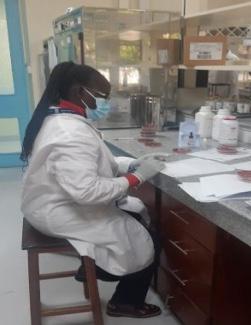
PHOTO | COURTESY
Joyce Kidogo, a Medical Laboratory Technologist, examining the culture plates for precise diagnosis.
PHOTO | COURTESY
State-of-the-art BACTEC blood culture machine in the microbiology laboratory
Hematology Laboratory
This is an important component in disease diagnosis and patients’ management. This branch of medicine is concerned with the study of the cause, prognosis, treatment, and prevention of diseases related to blood.
It involves treating diseases that affect the production of blood and its components, such as blood cells, hemoglobin, blood proteins, bone marrow, platelets, blood vessels, spleen, and the mechanism of coagulation. Such diseases might include hemophilia, blood clots (thrombus), other bleeding disorders, and blood cancers such as leukemia, multiple myeloma, and lymphoma. Our medical technologists and hematologists frequently analyze blood and the processes include but are not limited to; Full blood count – This is a count of the total number of red blood cells, white blood cells, and platelets present in the blood. Their distribution is vital in disease diagnosis.
Blood film - Blood is smeared over a glass slide that is stained with specific dyes and viewed under a microscope. The number, shape, and size of blood cells and the presence of any abnormal cells or immature cells are noted. The stain used for reticulocytes or immature red blood cells is Heilmeyer’s reticulocyte stain.
Staining may flag up abnormally shaped red blood cells such as sickle cells or spherocytes. Staining may also detect blood parasites such as malaria, toxoplasmosis, and microfiliariasis. Assessment and staining of immature platelets or megakaryocytes may also be performed as well as assessment of granulocytosis. The erythrocyte sedimentation rate (ESR) is a type of blood test that measures how quickly erythrocytes (red blood cells) settle at the bottom of a test tube that contains a blood sample. Normally, red blood cells settle relatively slowly. A faster-than-normal rate may indicate inflammation in the body. Inflammation is part of your immune response system. It can be a reaction to an infection or injury. Inflammation may also be a sign of chronic disease, an immune disorder, or other medical condition.
Our team obtains bone marrow aspirates for laboratory examination. A bone marrow biopsy is usually done if the healthcare provider thinks that the patient has a problem making blood cells. A pathologist examines blood and bone marrow samples for the detection of chronic myeloproliferative disorders in the laboratory and makes an informed decision based on the diagnosis.
Our laboratory can analyze for Iron status and anemias by performing tests such as serum ferritin, vitamin B12, and folate levels. Platelet function in bleeding and coagulation are checked in our facility using a test called prothrombin time, activated partial thromboplastin time test, thrombin time, and fibrinogen levels. We can diagnose thrombotic disorders by carrying out a D-dimer assessment.
Electrophoresis is an important test used to examine proteins in the blood such as hemoglobin and to check for hemoglobinopathies such as thalassemia or sickle cell anemia.
Our pathologists perform fine needle aspiration which is a type of biopsy procedure where a thin needle is inserted into an area of abnormalappearing tissue or body fluid. As with other types of biopsies, the sample collected during fine needle aspiration can help make a diagnosis or rule out conditions such as cancer.
Immunocytochemical techniques for detecting antigens both inside and on the surface of cells. Immunocytochemical investigations
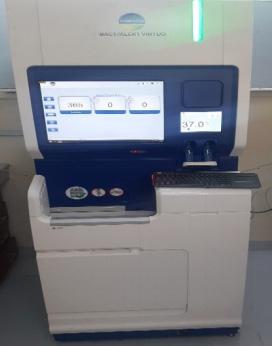
of fixed cells are used to enhance diagnostic accuracy in haematology and oncology.
The laboratory has state-of-the-art coultergrams, Coagulometers, an Automated ESR machine (results obtained within 5 minutes), and an HB electrophoresis machine.
Blood Transfusion Laboratory
This plays an important role in the management of our clients who desperately need a blood transfusion for various reasons. A blood transfusion provides blood or blood components (Cryoprecipitate: Helps blood clot process, Plasma: Carries nutrients your body needs, Platelets: Help blood clot process. Red blood cells: Carry oxygen throughout the body).
Transfusion becomes important if an individual has lost blood due to an injury, during surgery, or has certain medical conditions that affect the blood or its components. The blood typically comes from donors. Our facility ensures transfusions are a safe, low-risk treatment.
The laboratory has state-ofthe-art equipment that facilitates service delivery by the able and well-trained team of staff. The equipment includes NEO GALILEO and ECHO machine both of which do grouping, cross matching, antibody screening, and antibody identification, and Treponema pallidum hemagglutination (TPHA). Component Cryofuge is used in blood component preparation.
The hospital has acquired new robust immunology equipment for blood screening (ALINITY platform). Serological tests are performed on the donated blood to prevent recipients from accidental infections from HIV, Hepatitis B, and C, Syphilis among others.
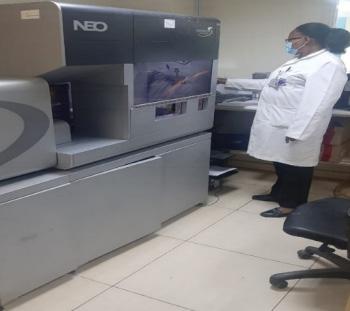
PHOTO | COURTESY
Pepetua Asuko, a Mediacal Laboratory Technologist and In-Charge of BTU laboratory, conducting a quality assessment on NEO machine
PHOTO | COURTESY
Gerald Chuani, a medical Laboratory Technologist, handling the Automatic MYR machine critical in histological tissue processing
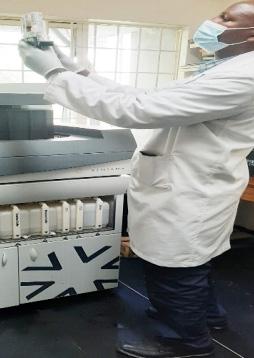
Histology Laboratory
This deals with the study of the microscopic structure of tissues. The Histology Laboratory is equipped to process a wide range of specimens from paraffin-embedded sections to non-decalcified bone including specimens with orthopedic implants and to perform a variety of histological and immunohistochemical analyses on bone, cartilage, and tissue samples.
This laboratory plays an important diagnostic role in the management of patients with suspected cancer conditions. Prompt diagnosis alleviates the suffering of our clients. The synergy between the University of Nairobi and Kenyatta National Hospital staff is commendable. The laboratory is set to receive more state-of-the-art equipment and structural facelift. This will help further improve the efficiency and effectiveness of our services.
Comprehensive Care Clinic Laboratory
This was established to take care of patients seeking services in Comprehensive Care Clinic that deals with HIV-infected patients. Among the tests done includes; viral load level, CD4 count, hemogram, TB analysis on Gene Expert platform, renal and liver profile, among others. The critical role played by this facility in the diagnosis and treatment of our clients cannot be over-emphasized.
Under this laboratory, we also have a molecular wing that handles PCR COVID 19 testing. The pandemic that broke out in March 2020 has dealt a big blow to the health sector as well as the socioeconomic status across the globe.
Our expertise came in handy to play our role as the powerhouse laboratory in providing quick results that helped a great deal in the diagnosis and management of the victims.
Kenyatta Prime Care Clinic Laboratory
This was set up to serve the Comprehensive Care Clinic clients. The laboratory has a modern laboratory facility to offer quick service to our prime care clients. The laboratory-like the entire KPCC has gained popularity over time. Our resolve is to move with speed to keep pace with the ever-increasing demand.
Critical Care Laboratory (CCU) and Renal Unit Laboratory (RU)
These are two points of care facilities that serve the critical Care Unit and Renal Unit, respectively. CCU laboratory provides immediate Blood Gas Analysis (BGA), lactate, glucose level, electrolytes, and hemoglobin level.
This analysis helps the clinicians to know the physiological status of the patient and provides a road map on relevant changes and treatment to be adopted.
In conclusion, the Department of Laboratory Medicine will continue to play its central role in the diagnosis and management of our clients. We will endeavor to optimize patient experience through innovative, medical laboratory services, facilitate training and research.
As a department, we are working with the hospital management to centralize our laboratory services under one roof to improve customer satisfaction. This will see us have a one-stop-shop service arrangement to cut on time wasted by our clients as they move from one end of the hospital to the other in search of our laboratory services.










